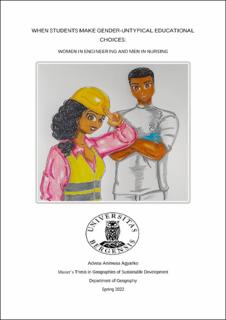WHEN STUDENTS MAKE GENDER-UNTYPICAL EDUCATIONAL CHOICES: Women in Engineering and Men in Nursing.
Master thesis
Permanent lenke
https://hdl.handle.net/11250/2997578Utgivelsesdato
2022-05-16Metadata
Vis full innførselSamlinger
- Master theses [144]
Sammendrag
Both males and females face forms of gender stereotypes in their everyday lives, right from the workplace to homes. Gender stereotypes have also found their way into educational institutions of which universities are no exception. This thesis, based on a two-month-long fieldwork in Ghana in 2021, centralizes on gender stereotypes. It divulges the experiences, challenges and study situations of male nursing students and female engineering students at the University of Ghana. Nursing and Engineering are two very gender stereotypical courses and career paths. Conceptualizations of gender such as Gender as a Social Construction, Gender Ideologies and Gender Roles will act as frameworks in explaining the various experiences of respondents as well as the reasons behind their current study situations. This thesis addresses the research question: How do gender stereotypes influence the study situation for students making gender-untypical educational choices at the University of Ghana? The main objectives of this research are: 1. To explore the reasons behind male nursing students and female engineering students choosing such gender-untypical programmes. 2. To divulge the experiences of male nursing students and female engineering students. 3. To identify the coping strategies of these students. The qualitative methodological approach was applied in this study. Data was collected via semi-structured interviews. A total of 31 respondents participated. The study identifies that gender ideologies, the social construction of appropriate behaviour for both men and women, play important roles in the educational choices and eventually career paths of students. Some students who make gender untypical educational choices, particularly the men studying nursing, raise brows and are often subjected to ridicule. The women studying engineering on the other hand, have their femininity questioned. The findings of this study reveal that gender stereotyping still exists even in the academic society. The gender-untypical students i.e., men in nursing and women in engineering, come up with strategies to cope with the negative gender stereotypes they face. These include ignoring stereotypical attitudes and defending themselves against such negative stereotypical behaviours.
Utgiver
The University of BergenOpphavsrett
Copyright the Author. All rights reservedBeslektede innførsler
Viser innførsler beslektet ved tittel, forfatter og emneord.
-
To Gender or not To Gender? Exploring Gender Variations through Time and Space
Gaydarska, Bisserka; Rebay-Salisbury, Katharina; Ramírez Valiente, Paz; Fries, Jana Esther; Hofmann, Daniela; Augereau, Anne; Chapman, John; Mina, Maria; Pape, Eleonore; Ialongo, Nicola; Nordholz, Daniela; Bickle, Penny; Haughton, Mark; Robb, John; Harris, Oliver (Journal article; Peer reviewed, 2023)This article is based on an EAA session in Kiel in 2021, in which thirteen contributors provide their response to Robb and Harris's (2018) overview of studies of gender in the European Neolithic and Bronze Age, with a reply ... -
The Gendering of a Farming System. A study of the relationship between gender and agricultural production in Ghana.
Alstad, Anna Dybwad (Master thesis, 2018-06-12)Gender issues have increasingly been given attention to in research on agriculture and farming systems. Prior to the 1970s, gender was rarely addressed, as economic activities and more technical descriptions were prioritized ... -
Gender congruency from a neutral point of view: The roles of gender classes and conceptual connotations
Bender, Andrea; Beller, Sieghard; Klauer, Karl Christoph (Peer reviewed; Journal article, 2018)The question of whether language affects thought is long-standing, with grammatical gender being one of the most contended instances. Empirical evidence focuses on the gender congruency effect, according to which referents ...
